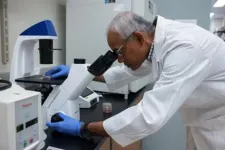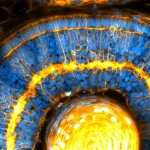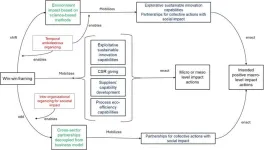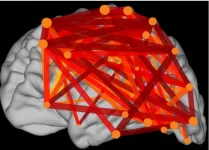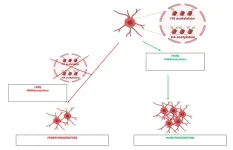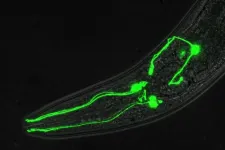Research spotlight: Generative AI “drift” and “nondeterminism” inconsistences are important considerations in healthcare applications
2024-08-12
Samuel (Sandy) Aronson, ALM, MA, executive director of IT and AI Solutions for Mass General Brigham Personalized Medicine and senior director of IT and AI Solutions for the Accelerator for Clinical Transformation, is the corresponding author of a paper published in NEJM AI that looked at whether generative AI could hold promise for improving scientific literature review of variants in clinical genetic testing. Their findings could have a wide impact beyond this use case.
How would you summarize your study for a lay audience?
We tested whether ...
Comprehensive atlas of normal breast cells offers new tool for understanding breast cancer origin
2024-08-12
INDIANAPOLIS — Researchers at the Indiana University Melvin and Bren Simon Comprehensive Cancer Center have completed the most extensive mapping of healthy breast cells to date. These findings offer an important tool for researchers at IU and beyond to understand how breast cancer develops and the differences in breast tissue among genetic ancestries.
Published this month in Nature Medicine, researchers developed a comprehensive atlas of breast tissue cells – including details ...
Huang studying electric distribution system protection – Modeling and testing with real-time digital simulator
2024-08-12
Liling Huang, Associate Professor, Department of Electrical and Computer Engineering Dominion Energy Faculty Fellow, received funding for: “Electric Distribution System Protection - Modeling and Testing with Real-Time Digital Simulator.”
Huang will address the complexities of the electric distribution system introduced by Distributed Energy Resources (DERs) through Real-Time Digital Simulator (RTDS) modeling and Hardware-in-the Loop (HIL) simulation to enhance protection system ...
Singh receives funding for AI innovation for economic competitiveness
2024-08-12
JP Singh, Distinguished University Professor, Schar School of Policy and Government, received funding for: “George Mason University Center for AI Innovation for Economic Competitiveness.” He is collaborating on the project with Co-Principal Investigator Amarda Shehu, Associate Vice President of Research, Institute for Digital Innovation, Professor, Computer Science, College of Engineering and Computing (CEC); Jesse Kirkpatrick, Research Associate Professor, Philosophy, College of Humanities and Social Sciences; Acting Director, Institute for Philosophy and Public Policy, Philosophy and Religious Studies; Terry Clower, Northern Virginia Chair in Local ...
Bacteria in lakes fight climate change
2024-08-12
Methane is a potent greenhouse gas frequently produced in the sea and in fresh water. Lakes in particular release large quantities of this climate-killer. Fortunately, however, there are microorganisms that counteract this: They are able to utilize methane to grow and generate energy, thus preventing it from being released into the atmosphere. These microorganisms, known as methanotrophs, are therefore regarded as an important "biological methane filter".
Methanotrophs comprise various groups of microorganisms, and many questions about their way of life have yet to be answered. A study by researchers from the Max Planck Institute for ...
How cell nuclei organize eyes and brain
2024-08-12
(Santa Barbara, Calif.) — In work conducted both at UC Santa Barbara and the Physics of Life Excellence Cluster of TU Dresden, biophysicist Otger Campàs and his research group have found that cell nuclei control the architecture and mechanics of eye and brain tissues during embryonic development. These results add a new role for the cell’s nucleus in tissue organization, well beyond its established role in genetic regulation.
“We were measuring tissue stiffness in the zebrafish retina, and realized that it depended on the packing of nuclei. This was totally unexpected because tissue mechanics is believed to depend on cell surface interactions, but not ...
$1.5 million grant will build global network to prevent exploitation of Indigenous data
2024-08-12
TUCSON, Arizona — Researchers at the University of Arizona Mel and Enid Zuckerman College of Public Health and the U of A Native Nations Institute are establishing a framework that protects the way Indigenous data is collected and used around the world, thanks to a $1.5 million grant from the National Science Foundation.
For as long as researchers, health care providers and government agencies have studied Indigenous communities, there has been mistrust about the data collected. Indigenous peoples have raised concerns about who owns and profits from the data, as well as how it is used. Using the grant, the researchers, in ...
Engineers bring efficient optical neural networks into focus
2024-08-12
EPFL researchers have published a programmable framework that overcomes a key computational bottleneck of optics-based artificial intelligence systems. In a series of image classification experiments, they used scattered light from a low-power laser to perform accurate, scalable computations using a fraction of the energy of electronics.
As digital artificial intelligence systems grow in size and impact, so does the energy required to train and deploy them – not to mention the associated carbon emissions. Recent research suggests that if current AI server production continues at its current pace, their annual energy consumption could outstrip that of ...
"All of us urgently need to band together to pass a robust and just earth to future generations," says eminent environmental lawyer Edith Brown Weiss
2024-08-12
Amsterdam, August 12, 2024 – An article in a special issue on The Planetary Future published in Environmental Policy and Law (EPL) by IOS Press (now part of Sage), considers the Planetary Trust as an essential framework underlying today’s kaleidoscopic world, reviews important developments in implementing the Trust, and focuses on important steps to take now to ensure a just, robust Earth system for present and future generations.
Bharat H. Desai, PhD, Jawaharlal Nehru University, Centre for International Legal Studies, and Editor-in-Chief ...
Framing sustainability strategies for the enactment of corporate actions with positive macro-level impact: Evidence from a developing country
2024-08-12
Transforming Sustainability Strategies: Ecuadorian Corporations Leading the Way
The Bigger Picture: Shifting from Micro to Macro Impacts
The research redefines sustainability by examining how strategic framing can elevate corporate actions to achieve significant macro-level impacts. Moving beyond individual and community-focused efforts, the study highlights broad-scale changes that enhance societal and environmental well-being, including nationwide poverty reduction, environmental improvements, and public health advancements.
Corporations ...
Comparative safety of in utero exposure to buprenorphine combined with naloxone vs buprenorphine alone
2024-08-12
About The Study: There were similar and, in some instances, more favorable neonatal and maternal outcomes for pregnancies exposed to buprenorphine combined with naloxone compared with buprenorphine alone. For the outcomes assessed, compared with buprenorphine alone, buprenorphine with naloxone during pregnancy appears to be a safe treatment option. This supports the view that both formulations are reasonable options for the treatment of opioid use disorder in pregnancy, affirming flexibility in collaborative treatment decision-making.
Corresponding ...
Pink elephants in the brain?
2024-08-12
Our brain interprets visual information by combining what we see with what we already know. A study published in the journal Neuron by researchers at the Champalimaud Foundation, and supported by the CaixaResearch Health Call of the la Caixa Foundation, reveals a mechanism for learning and storing this existing knowledge about the world. They found that neurons are wired to connect seemingly unrelated concepts. This wiring may be crucial for enhancing the brain’s ability to predict what we see based on past experiences, and bring us a step closer to understanding how this process goes awry ...
Heat caused over 47,000 deaths in Europe in 2023, the second highest burden of the last decade
2024-08-12
More than 47,000 people died in Europe as a result of high temperatures in 2023, the warmest year on record globally and the second warmest in Europe. This is the estimate of a study led by the Barcelona Institute for Global Health (ISGlobal), a centre supported by the "la Caixa" Foundation, and published in Nature Medicine. The researchers report that the vulnerability to heat of European societies has progressively decreased over the present century, and estimate that without these societal adaptation processes, the heat related mortality burden over the past year would have been 80% higher.
The study replicates the methodology used last year in another paper ...
Early-childhood tablet use and outbursts of anger
2024-08-12
About The Study: Child tablet use at age 3.5 years was associated with more expressions of anger and frustration by the age of 4.5 years in this study. Child proneness to anger/frustration at age 4.5 years was then associated with more use of tablets by age 5.5 years. These results suggest that early-childhood tablet use may contribute to a cycle that is deleterious for emotional regulation.
Corresponding Author: To contact the corresponding author, Caroline Fitzpatrick, PhD, email caroline.fitzpatrick@usherbrooke.ca.
To access the embargoed ...
Alcohol consumption patterns and mortality among older adults with health-related or socioeconomic risk factors
2024-08-12
About The Study: In this cohort study of older drinkers from the UK, even low-risk drinking was associated with higher mortality among older adults with health-related or socioeconomic risk factors. The attenuation of mortality observed for wine preference and drinking only during meals requires further investigation, as it may mostly reflect the effect of healthier lifestyles, slower alcohol absorption, or nonalcoholic components of beverages.
Corresponding Author: To contact the corresponding author, Rosario Ortolá, MD, PhD, ...
An appetizer can stimulate immune cells’ appetite, a boon for cancer treatments
2024-08-12
(Santa Barbara, Calif.) — The body has a veritable army constantly on guard to keep us safe from microscopic threats from infections to cancer. Chief among this force is the macrophage, a white blood cell that surveils tissues and consumes pathogens, debris, dead cells, and cancer. Macrophages have a delicate task. It’s crucial that they ignore healthy cells while on patrol, otherwise they could trigger an autoimmune response while performing their duties.
Researchers at UC Santa Barbara sought to understand how these immune cells choose what and when to eat. A paper published ...
New genetically engineered wood can store carbon and reduce emissions
2024-08-12
Researchers at the University of Maryland genetically modified poplar trees to produce high-performance, structural wood without the use of chemicals or energy intensive processing. Made from traditional wood, Engineered wood is often seen as a renewable replacement for traditional building materials like steel, cement, glass and plastic. It also has the potential to store carbon for a longer time than traditional wood because it can resist deterioration, making it useful in efforts to reduce carbon emissions.
But the hurdle to true sustainability in engineered wood is that it requires processing with volatile chemicals and a significant amount of energy, and ...
NK cells expressing interleukin-21 show promising antitumor activity in glioblastoma cells
2024-08-12
Natural killer (NK) cells engineered to express interleukin-21 (IL-21) demonstrated sustained antitumor activity against glioblastoma stem cell-like cells (GSCs) both in vitro and in vivo, according to new research from The University of Texas MD Anderson Cancer Center.
The preclinical findings, published today in Cancer Cell, represent the first evidence that engineering NK cells, a type of innate immune cell, to secrete IL-21 resulted in strong activity against glioblastoma, a cancer type in need of more effective treatment options.
“Our ...
Strong insurance laws help kids get access to mental health care
2024-08-12
When states require insurers to cover mental and behavioral health, children get better access to care, according to a UC San Francisco-led study of nearly 30,000 U.S. caregivers.
They found that 1 in 8 caregivers had difficulty accessing mental health services for their children between 2016 and 2019. But those who lived in states with the most comprehensive mental and behavioral health coverage laws were about 20% less likely to report trouble accessing care than those who lived in states with the least comprehensive laws.
Caregivers of Black and Asian children were more likely to report poor access to mental and ...
State-of-the-art brain recordings reveal how neurons resonate
2024-08-12
For decades, scientists have focused on how the brain processes information in a hierarchical manner, with different brain areas specialized for different tasks. However, how these areas communicate and integrate information to form a coherent whole has remained a mystery. Now, researchers at University of California San Diego School of Medicine have brought us closer to solving it by observing how neurons synchronize across the human brain while reading. The findings are published in Nature Human Behavior and are also the basis of a thesis by UC San Diego School of Medicine doctoral candidate Jacob Garrett.
“How the activity of the brain relates to the subjective ...
New study reveals unique histone tag in adult oligodendrocyte progenitor cells, opening doors for advanced myelin repair therapies
2024-08-12
NEW YORK, August 12, 2024 — In a groundbreaking study, researchers with the Advanced Science Research Center at the CUNY Graduate Center (CUNY ASRC) have identified a distinct histone tag in adult oligodendrocyte progenitor cells (OPCs) that may pave the way for innovative therapies targeting myelin repair, a critical target for several neurodegenerative and psychiatric disorders, including multiple sclerosis, Alzheimer’s disease, and schizophrenia. The histone tag, characterized by lysine 8 acetylation on histone H4, identifies a significant departure from the histone modifications found in neonatal OPCs.
Detailed in a ...
SwRI launches Electrified Vehicle and Energy Storage Evaluation-II battery consortium
2024-08-12
SAN ANTONIO — August 12, 2024 – Southwest Research Institute (SwRI) is launching the next phase of an electric vehicle (EV) battery consortium dedicated to understanding performance of energy storage systems. The Electrified Vehicle and Energy Storage Evaluation-II (EVESE-II) consortium builds on more than a decade of SwRI-led, precompetitive research with companies across the mobility sector.
“We are proud to serve the EV industry by bringing together manufacturers, suppliers and battery designers and developers with materials scientists to address a variety of challenges,” said Dr. Andre Swarts, an SwRI staff engineer ...
Possible explanation for link between diabetes and Alzheimer's
2024-08-12
People with type 2 diabetes are at increased risk of Alzheimer's disease and other cognitive problems. A new study led by Umeå University, Sweden, shows that the reason may be that people with type 2 diabetes have more difficulty getting rid of a protein that may cause the disease.
"The results may be important for further research into possible treatments to counteract the risk of people with type 2 diabetes being affected by Alzheimer's," says Olov Rolandsson, senior professor at the Department of Public Health and Clinical Medicine at Umeå University, research leader and first author of the study.
The substances ...
Surf spots are global ally in climate fight, study finds
2024-08-12
Surf Spots are Global Ally in Climate Fight, Study Finds
Nearly 90 million metric tonnes of planet-warming carbon found surrounding surf breaks across the world; U.S., Australia, Indonesia, Brazil identified as conservation priorities
ARLINGTON, Va. (Aug. 12, 2024) – A first-of-its-kind study, published today in Conservation Science and Practice, has found that the forests, mangroves and marshes surrounding surf breaks store almost 90 Mt (million metric tonnes) of climate-stabilizing “irrecoverable carbon,” making these coastal locations ...
Taking a ‘one in a million’ shot to tackle dopamine-linked brain disorders
2024-08-12
Dopamine, a powerful brain chemical and neurotransmitter, is a key regulator of many important functions such as attention, experiencing pleasure and reward, and coordinating movement. The brain tightly regulates the production, release, inactivation and signaling of dopamine via a host of genes whose identity and link to human disease continue to expand.
Brain disorders associated with altered dopamine signaling include substance use disorder, attention deficit hyperactivity disorder (ADHD), autism, bipolar disorder, schizophrenia and Parkinson’s disease. The complexity of the human brain and its ...
[1] ... [983]
[984]
[985]
[986]
[987]
[988]
[989]
[990]
991
[992]
[993]
[994]
[995]
[996]
[997]
[998]
[999]
... [8813]
Press-News.org - Free Press Release Distribution service.

